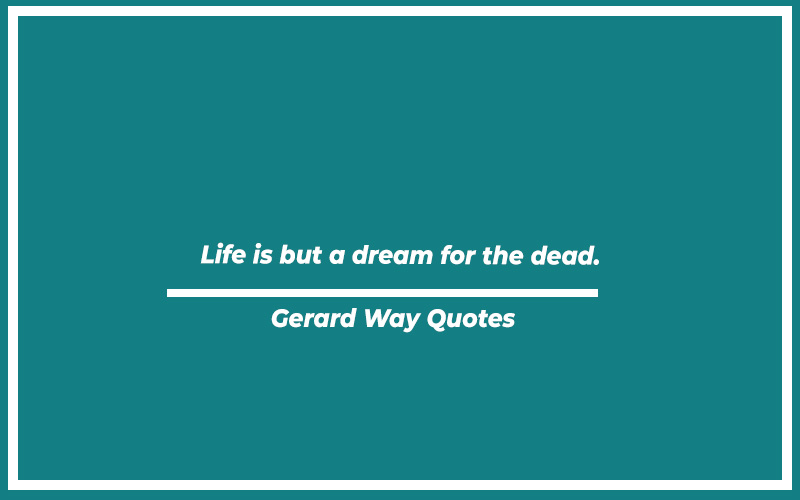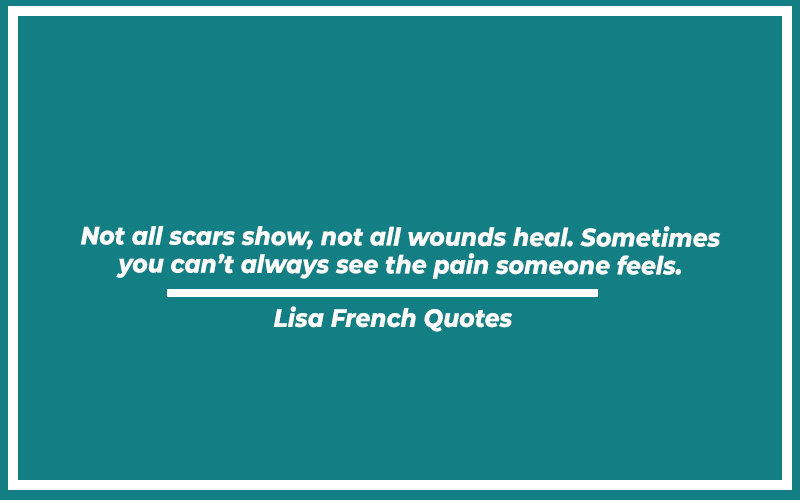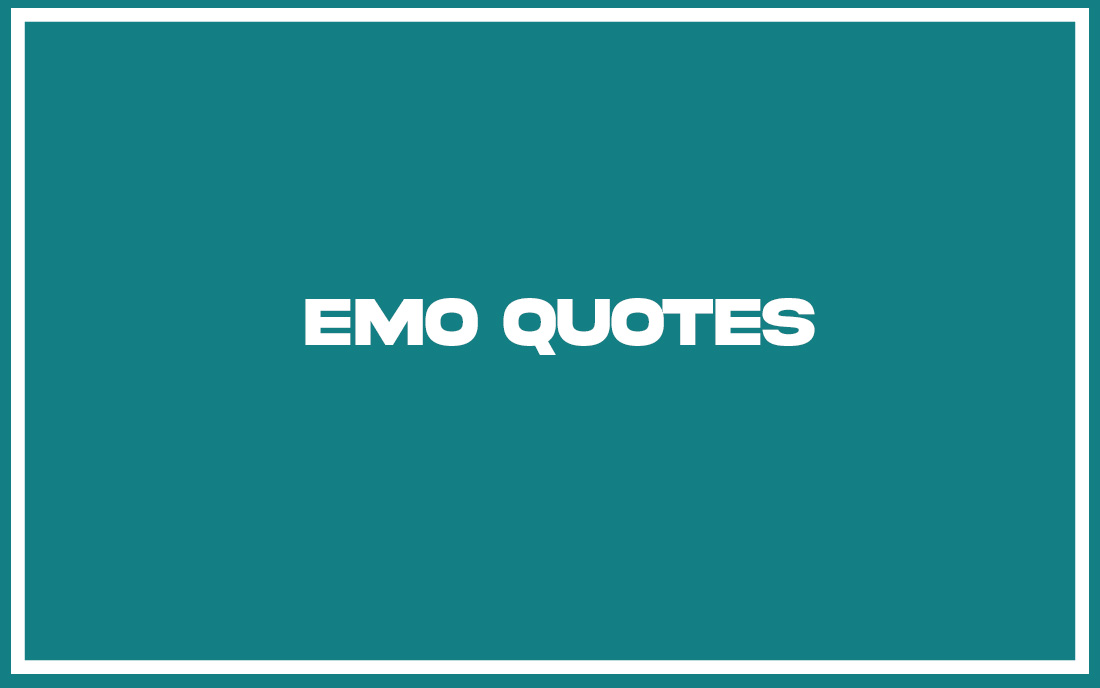Emo quotes, often characterized by their introspective and deeply emotional nature, reflect the essence of the emo subculture. Emo, short for “emotional,” originated as a style of music in the 1980s and has since evolved into a broader cultural movement. This movement is marked by its emphasis on emotional expression, introspection, and a sense of melancholy or existential angst.
The quotes associated with this culture often delve into themes of love, heartbreak, loneliness, existential dread, and the search for identity. They are known for their raw, unfiltered honesty, providing a voice to feelings that are often difficult to express.
Emo quotes resonate not just within the subculture but also with a wider audience who find solace in their candid expressions of the human condition. They often serve as a means for individuals to connect with their own emotions and experiences, offering comfort in the shared understanding of life’s deeper and sometimes darker aspects.
Top Emo Quotes

“Life is but a dream for the dead.” – Gerard Way
This quote from Gerard Way captures the essence of the emo perspective on existence, suggesting that life, in its complexity and pain, can sometimes feel unreal or dreamlike, especially for those who feel disconnected or emotionally dead.
It’s a reflection on the disconnect between one’s inner world and the external reality, and how those who are deeply hurting may feel as though they’re living in a dream.
“I wish I could care what you do or where you go but I can’t. My dear, I don’t give a damn.” – Margaret Mitchell
Margaret Mitchell’s quote portrays a sense of apathy and detachment, often a defense mechanism against further emotional pain.
It’s about the moment of realization where one no longer feels invested in someone else’s actions or decisions, marking a turning point in emotional detachment or self-preservation.
“I stopped fighting my inner demons. We are on the same side now.” – Darynda Jones
Darynda Jones’ quote offers a unique perspective on the concept of inner demons. Instead of continuing a battle against them, there is a shift towards acceptance and harmony.
This signifies a deep understanding and embracement of one’s darker aspects, a common theme in emo culture. The quote suggests that making peace with our flaws and darker thoughts can be more beneficial than constant internal conflict. It emphasizes the importance of self-acceptance and the recognition that our struggles are a part of who we are
“We think too much and feel too little.” – Charlie Chaplin
Charlie Chaplin’s quote addresses the imbalance between overthinking and under-feeling that many people experience.
It suggests that in modern society, rationality often overshadows emotion, leading to a disconnection from our true feelings and a lack of genuine emotional expression.
“Feel, he told himself, feel, feel, feel. Even if what you feel is pain, only let yourself feel.” – P.D. James
P.D. James’s words emphasize the importance of allowing oneself to experience emotions fully, even if those emotions are painful.
It reflects the emo ethos of embracing all feelings, recognizing that feeling pain is integral to the human experience and preferable to numbness or disconnection.
“You’re not in love with me, not really, you just love the way I always made you feel. Like you were the center of my world. Because you were. I would have done anything for you.” – Abby McDonald
This quote by Abby McDonald delves into the complexity of relationships and love. It distinguishes between true love for a person and love for the feelings that person provides.
It’s a poignant reminder of the disparity between being loved for who you are versus being loved for the emotions you evoke in others.
“Depression is the most unpleasant thing I have ever experienced. It is that absence of being able to envisage that you will ever be cheerful again. The absence of hope. That very deadened feeling, which is so very different from feeling sad. Sad hurts but it’s a healthy feeling. It is a necessary thing to feel. Depression is very different.” – J.K. Rowling
J.K. Rowling’s quote provides a stark distinction between sadness and depression.
While sadness is a natural and healthy emotion, depression is portrayed as a deeper, more consuming state that involves a loss of hope and an inability to envision a positive future. It highlights the profound impact depression has on one’s overall perspective on life.
The heart grows brutal from feeding on fantasies.” – Robert Pinsky
Robert Pinsky’s quote poignantly reflects on the dangers of living in a world of illusions. When we feed our hearts with unattainable fantasies, we often end up hardening ourselves to the realities of life.
This brutal transformation is a defense mechanism against the pain of unfulfilled dreams and desires. It speaks to the human tendency to retreat into a fantasy world, only to find ourselves more disconnected and hardened to the real world and its possibilities.
“I am furious, nails digging into my palms, tears stinging my eyes. I feel a flash of intense anger. I feel as though something has been taken away from me.” – Paula Hawkins
Paula Hawkins vividly captures the visceral, overwhelming nature of anger and loss.This quote conveys the physical and emotional intensity of feeling wronged or deprived, emphasizing the raw, consuming nature of such emotions. It portrays anger not just as an emotion, but as a physical experience that engulfs the whole being, illustrating the profound impact of emotional pain and loss.
“Each person’s heart breaks in its own way. Every cure will be different, but there are some things we all need. Before anything else, we need to feel safe.” – Erica Bauermeister
Erica Bauermeister’s words beautifully encapsulate the individual nature of heartbreak and healing. While acknowledging the unique ways in which each person experiences and recovers from emotional pain, she highlights the universal need for safety and understanding in the healing process.
This quote is a reminder of the personalized nature of emotional healing, while also recognizing the common human needs that underlie our experiences of pain and recovery.
“You try every trick in the book to keep her. You write her letters… But in the end, you do.” – Junot Dìaz
Junot Díaz’s quote reflects the desperation and futile attempts often made in an effort to save a failing relationship. It speaks to the depth of emotions and the lengths one will go to hold onto love, yet ultimately it touches on the painful realization and acceptance of letting go.
This quote resonates with anyone who has experienced the heartache of trying to hold onto a relationship that is slipping away.
“Still Love remained — a Love, chastened and sad, with drooping wings and somewhat doubting smile — yet it was Love . . .” – Marie Corelli
Marie Corelli’s quote eloquently captures the enduring, though often wounded, nature of love. It speaks to how love can survive through hardship and doubt, albeit in a changed form.
This quote resonates with the idea that even when love is burdened by sadness and uncertainty, its essence persists. It’s a poignant reminder of love’s resilience in the face of adversity.
“I stare at accidents in a sick attempt to feel at all.” – via YouTube
This quote, attributed to a YouTube comment, starkly portrays the depths of emotional numbness. It speaks to the extreme measures one might resort to in order to break through the suffocating feeling of numbness, seeking any form of sensation, even through negative experiences.
This quote is a raw depiction of the desperation for feeling in a state of emotional desensitization.
“She hated him and loved him, longed for him and loathed him, and cursed herself for feeling anything at all.” – Rick Yancey
Rick Yancey’s quote captures the tumultuous nature of conflicting emotions in a complex relationship. It reflects the inner turmoil of simultaneously experiencing love and hatred, desire and repulsion, towards the same person.
This quote vividly illustrates the confusing and often painful experience of dealing with contradictory emotions, and the frustration and self-reproach that can accompany these feelings.
“Poetry’s just so emo.” he said. “Oh, the pain. The pain. It always rains. In my soul.” – John Green, Paper Towns
John Green, in “Paper Towns,” humorously yet insightfully captures the emo culture’s penchant for deep, often melancholic expressions.
This quote reflects on the stereotype of emo individuals as overly emotional, using poetry as a medium to express profound inner turmoil. It’s a commentary on how poetic expressions can sometimes become clichéd representations of pain and sorrow, yet remain deeply resonant for those immersed in such emotions.
“I usually know almost exactly how I feel. The problem is, I just can’t tell anyone.” – Meg Cabot
Meg Cabot’s quote succinctly captures a common emotional dilemma: the clarity of one’s own feelings juxtaposed with the inability to communicate them. It highlights a sense of isolation and frustration that stems from this disconnect.
The quote resonates with those who find it challenging to express their inner emotional state, despite having a deep understanding of it.

“Not all scars show, not all wounds heal. Sometimes you can’t always see the pain someone feels.” – Lisa French
Lisa French’s quote poignantly reminds us that emotional pain and trauma are often invisible to others. It underscores the fact that many people carry unseen scars and that the absence of physical manifestations does not diminish the severity of their pain.
This quote encourages empathy and understanding towards those who may be suffering in silence.
“Behind this smile in my face lies the dark shadow of emptiness, hiding from your eyes within my gaze, concealed with sham happiness.” – Alexia Chase
Alexia Chase’s quote vividly depicts the facade that people often maintain to mask their true feelings. It illustrates the profound loneliness and emptiness that can hide behind a forced smile, a common theme in emo culture.
This quote resonates with the experience of feeling misunderstood and the effort to conceal true emotions behind a veneer of happiness.
“Honestly, I’d rather be anywhere else. Even home, where my dad begins almost every conversation with, “You should lose the black clothes and wear something with color.” Puh-lease. Like I want to look like every Barbie clone in Hell High, a.k.a. Oklahoma’s insignificant Haloway High School. Ironically, Dad doesn’t appreciate the bright blue streaks in my originally blond/now-dyed-black hair. Go figure. That’s color, right?” – Gena Showwalter
Gena Showwalter’s quote encapsulates the rebellious spirit of youth, struggling against parental expectations and societal norms. It reflects the emo culture’s emphasis on individuality and the frustration that comes from feeling misunderstood or pressured to conform.
The quote portrays the classic teenage angst and the desire to stand out in a world that often demands conformity.
“If I didn’t think, I’d be much happier.” – Sylvia Plath
Sylvia Plath’s quote succinctly captures the essence of overthinking and its impact on happiness. It suggests that constant analysis and rumination can lead to unnecessary suffering and unhappiness, a sentiment echoed in emo culture.
The quote speaks to the desire for a simpler state of mind, free from the burdens of excessive thought.
“Real love amounts to withholding the truth, even when you’re offered the perfect opportunity to hurt someone’s feelings.” – David Sedaris
David Sedaris in this quote delves into the complexity of love and truth. It suggests that true love often involves restraint and the ethical choice to protect someone’s feelings, even when honesty could be used as a weapon.
This quote reflects on the delicate balance between being truthful and being compassionate in relationships.
“The more I try to explain myself, the less I understand myself.” – Eugène Ionesco
Eugène Ionesco’s quote poignantly reflects on the complexity of self-understanding and expression. It suggests that in the effort to articulate our identity or feelings, we often encounter more confusion and ambiguity.
This insight is particularly relevant in emo culture, which emphasizes the intricate and often misunderstood nature of personal emotions and identity. The quote resonates with the struggle to grasp and communicate the depths of one’s inner world.
“It’s not what happens to us, but our response to what happens to us that hurts us.” – Stephen R. Covey
Stephen R. Covey’s quote highlights the significant impact of our reactions and attitudes towards life’s events. It implies that the pain we experience is often not directly caused by the events themselves, but by how we choose to respond to them.
This perspective aligns with the emo ethos of deep introspection and emotional complexity, underscoring the importance of self-awareness in managing our emotional well-being.
“In this world, wherever there is light – there are also shadows.” – Madara Uchiha, Naruto
This quote from the character Madara Uchiha in “Naruto” elegantly captures the duality of existence – where there is good, there will also be bad. It reflects the emo understanding that life is a balance of happiness and sorrow.
Embracing this duality is essential to appreciate the full spectrum of human emotions and experiences, resonating deeply with the emo culture’s exploration of both joy and despair.
“She can paint a pretty picture but this story has a twist. The paintbrush is a razor and the canvas is her wrist.” – Amy Efaw
Amy Efaw’s quote is a haunting metaphor for the hidden pain behind self-harm. It juxtaposes the creation of beauty with personal suffering, illustrating the complex relationship between external expressions and internal turmoil.
This quote confronts the reality of mental health struggles, particularly in emo culture, where such expressions are often a cry for help and understanding.
“Everyone has to fight with time to find their place before their inevitable death.” – Toki, Code:Breaker
This quote from “Code:Breaker” emphasizes the existential struggle to find meaning in life against the relentless march of time.
It resonates with the emo sentiment of urgency in understanding one’s purpose and place in the world. This perspective reflects the emo culture’s contemplation of mortality and the search for significance in the fleeting nature of existence.
“I hid my deepest feelings so well I forgot where I placed them.” – Amy Tan
Amy Tan’s quote speaks to the consequences of deeply repressing emotions. It illustrates how, in an effort to protect ourselves, we can lose touch with our true feelings.
This scenario is particularly relevant in emo culture, where exploring and expressing deep emotions is central. The quote highlights the journey and challenges of reconnecting with those parts of ourselves that we have hidden away.
Final Thoughts
In conclusion, emo quotes encapsulate a profound range of human emotions, from the depths of despair to the heights of introspection. They serve as a powerful medium for expressing the often complex and nuanced feelings associated with the emo subculture.
These quotes resonate with individuals who find a reflection of their own experiences in the raw, honest, and sometimes somber words. Emo quotes have not only defined a subculture but have also offered a universal language for discussing emotions that are frequently left unspoken.
They remind us of the power of words to articulate the intricacies of the human heart and mind, offering solace, understanding, and a sense of shared experience. Emo quotes, in their exploration of the darker and more introspective aspects of life, continue to be a poignant testament to the emotional depth and resilience of the human spirit.

